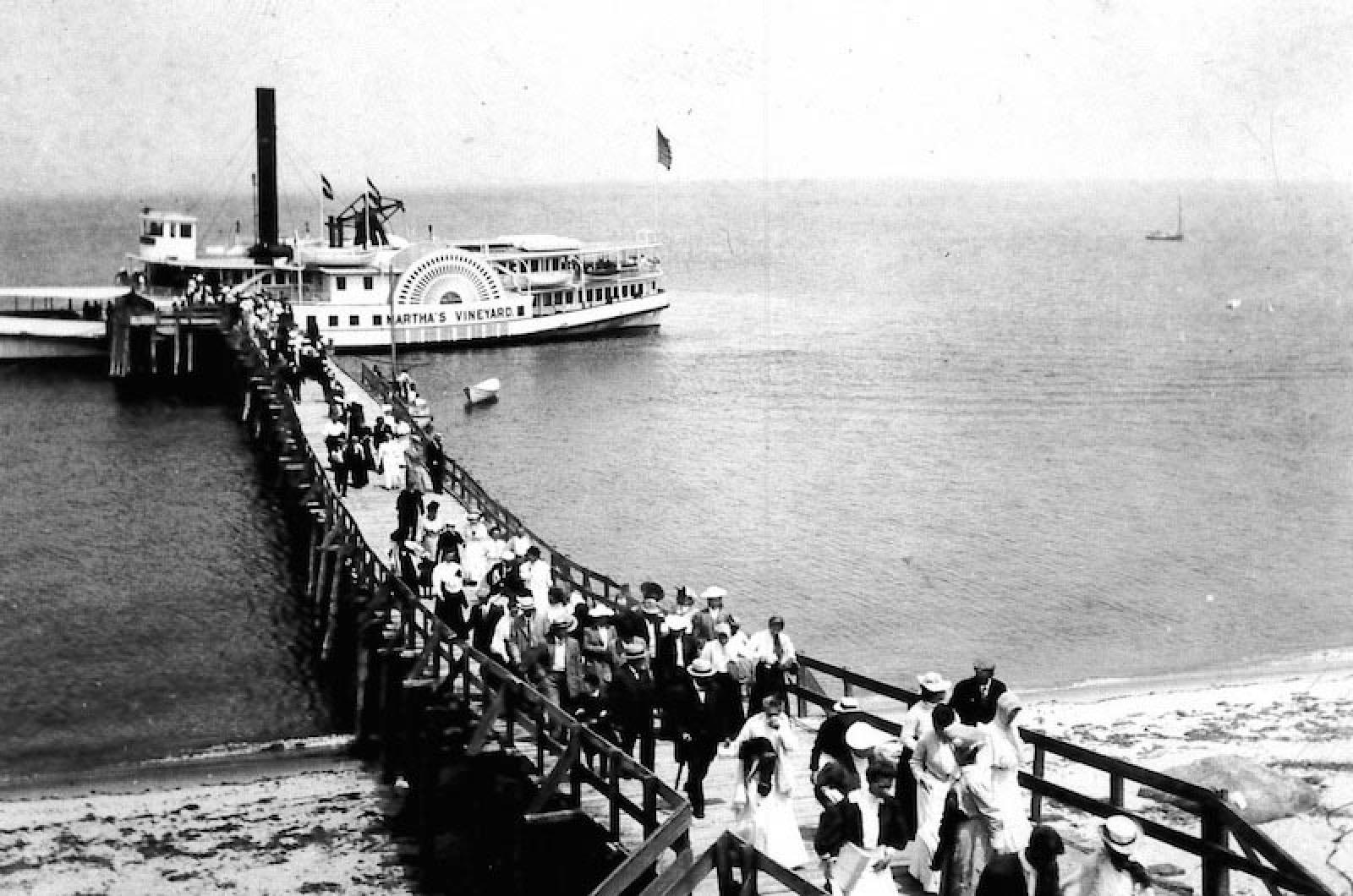From the Sept. 6, 1957 edition of the Vineyard Gazette:
It just doesn’t happen anymore. The Labor Day exodus of tradition. Time was, as it seemed, the entire summer population embarked on the same day, and the majority of them at the same hour, and the bulk of the year-round population turned out to say goodbye. Volumes could be written and have been written, in fact, of those days before the Vineyard had the ferry, when the Great Naushon, with a capacity of two thousand passengers, loaded at the Oak Bluffs pier and still could not handle the passengers. But not any more.
Well-planned use of the floating equipment this year smoothed out the traffic flow, expedited departures, and avoided all major delays or bottlenecks. It was likewise true that bookings of cars were spread over a longer period than has been usual in the past.
An important element in the situation was the availability of the new $2,700,000 steamer Nantucket for most effective use. As voted by the Authority earlier, she was excused from the New Bedford excursion run and put to work between Woods Hole and Nantucket. The Nobska meantime, took the New Bedford part of the schedule and worked in a shuttle trip between Woods Hole and Oak Bluffs; and the Nantucket, having ended her Nantucket trips made a run back to Woods Hole to Vineyard Haven and sailed again as the second section of the late ferry trip out.
Reports from the steamboat docks on Monday indicated an absence of the usual rush-and-worry features of Labor Day. It seemed likely that some summer colonists did not have to make a Labor Day deadline, or that they took warning from all the fearful things that have been published about Labor Day highway hazards and planned earlier or later departures. The crowds and cars that did depart may have constituted a retreat but not a rout.
Northeast Airlines, with eleven trips in and out scheduled for the day, was operating on schedule. The airline reported “quite heavy” riding away from the Island. Neither Northeast nor the ferry handled many passengers arriving at the Island at any time during the day.
Thus passed Labor Day, quietly and without any of the oldtime confusion of departure. Quiet in other ways also, with few accidents or incidents reported by the police save one break, on Thursday night, reported on Friday, at Bernard’s Garage, Oak Bluffs, where a window pane was broken to reach the catch, and about fifty dollars in change and forty dollars worth of spark-plugs were taken. Hardly a Labor Day incident at that.
And now comes autumn.
When school begins in the fall, as it is doing today in Edgartown, there are no doubt a certain number of mothers who are sending off the last of their offspring to begin their education, sometimes with sighs of relief(?) or anticipation of their new “freedom”.
One such Edgartown family was going through this process. The youngest was quite concerned about his mother, and what she would do in the absence of her three sons, and declared, “Oh, well, mother, you can always play our record player to keep from getting lonely!” To take the edge off the quiet, no doubt!
Here in New England, where this summer’s drought has been so much lamented, the following description of a storm at Martha’s Vineyard, appearing in the Vineyard Gazette for Sept. 1, 1882, will be interesting. It appears that in 1806 there were three months of extremely dry weather, followed by a remarkable flood in at least one part of Massachusetts. The appended account of it, headed Extract from a Public Print, appears in the ninth number of volume 1 of the Medical and Agricultural Register.
“Edgartown, (Martha’s Vineyard,) Aug. 28th, 1806.
“We have had a very severe storm here. On the morning of the twenty-third, the heavens appeared to be covered thick with darkness; the wind southwest; it now began to rain attended with flashes of lightning, not sharp, and but little thunder; the rain continued all day, and at times seemed to pour down in torrents; toward night it abated: in the night the wind shifted, and in the morning was at east; it soon began to rain, the wind veered to the northeast, and it increased to one of the severest gales I have ever experienced.
“The rain increased with the wind, and the face of the ground appeared a flood of water. The quantity that fell is almost inconceivable. A barrel that stood in the open field was filled. At the most moderate computation it fell thirty inches deep upon a level. It is impossible to estimate the damage it has done. The corn is all beat flat to the ground and the stalks stripped of their leaves. It has risen since, but will never recover. The labor of the husbandman, I presume, is cut short more than one-half. The prospect of fruit was promising; the apples are almost all blown down. “We have experienced this summer the extremes of drought and flood. From the twentieth of April to the twentieth of July but very little rain, and now a rain in judgment.”
Compiled by Hilary Wall




Comments
Comment policy »